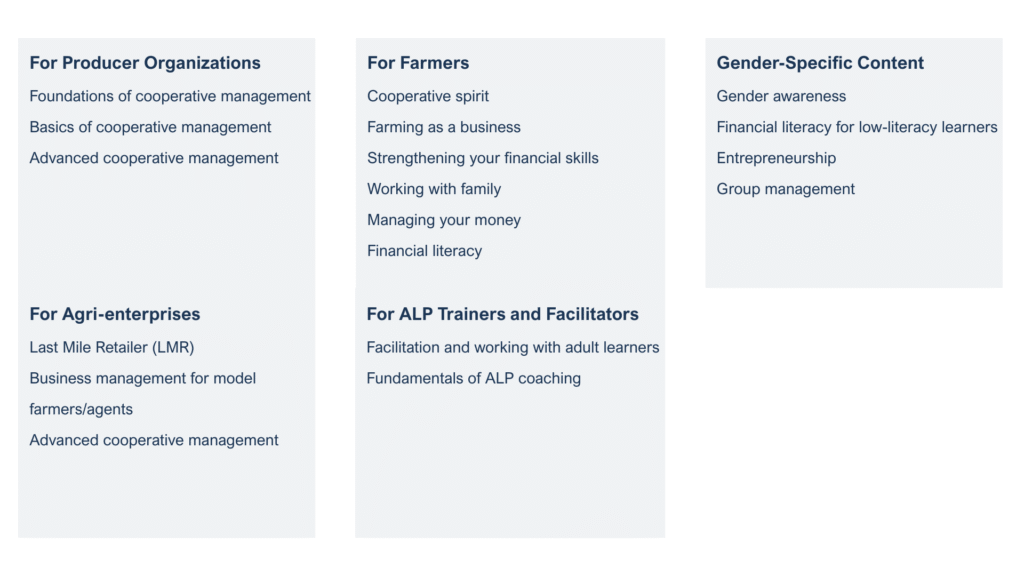Agribusiness Leadership Program (ALP)
A growing global population, changing diets, and shared imperatives for sustainability – to meet these challenges agribusinesses need to become more efficient, productive, and professional than ever.
IFC’s Agribusiness Leadership Program (ALP) helps by giving small agribusinesses the training and coaching resources they need to strengthen their supply chains, improve their operations, access new markets and financing, and do more for communities and smallholder farmers.
Featuring a rigorous assessment, training, and coaching program to professionalize farmers and enterprises throughout a company’s supply chain operations, ALP has helped thousands of farmer organizations and small enterprises positively transform their businesses.
Purpose :
We help agribusinesses to professionalize the operations of the smallholder farmers and producer organizations in their supply chains and create successful, sustainable commercial enterprises. Providing skills that help farmers and enterprise owners manage their businesses more effectively and make more informed decisions in the market, our program gives smallholder farmer organizations the tools they need to thrive.
Who benefits from ALP?
ALP clients are large agribusinesses who work with a range of informal producer groups, cooperatives, smallholders, last mile retailers and agri-entrepreneurs. They include:
- IFC Agribusiness clients
- Producer organizations (such as cooperatives)
- Lead farmers
- Smallholder Farmers
- Last Mile Retailers
- Agribusiness Market Ecosystem Alliance (AMEA) members
ALP’s global reach

What problems do we help clients solve?
ALP holistically addresses key challenges related to enhancing sustainability, efficiency, and accessibility within the supply chains of IFC clients. This is accomplished through:
- Improving cost efficiencies while sourcing food locally and sustainably
- Boosting the accessibility and affordability of quality inputs for farmers
- Achieving greater efficiency, safety, and transparency in supply chains
- Reduction of environmental impacts and compliance with sustainability standards
- Reducing gender inequities and by empowering female farmers and workers
What topics are covered?
ALP offers range of curricula and courses to meet the needs of the diverse agribusinesses we work with:

How ALP works
ALP uses assessment, training, coaching, and reassessment to strengthen small agribusinesses, which in turn strengthens the operations of clients who rely on smallholder supply chains.
By working with participants to design capacity-building tailored to their needs, ALP prepares famers, employees, and leaders of agribusinesses to meet the expectations of customers, suppliers, lenders, and other market players.
In a typical ALP project, our project team conducts a baseline assessment of the agribusiness, and then designs a capacity-building program tailored to learners’ needs, assessment scores, sector, and education levels. Capacity building usually involves a combination of in-person training, coaching, and digital learning opportunities. At the end of the project, agribusinesses are reassessed using the same assessment tool.
ALP’s blended learning approach
Since its launch in 2016, ALP has evolved from a face-to-face capacity-building program into a blended learning program, combining in-person training and coaching with opportunities for digital learning. Digital learning reinforces what is learned in person and promotes long-term remembering and application of learning. The project team will integrate digital learning where learner skill levels and technology access allow. ALP’s digital readiness survey provides insights into what is possible for a specific project.
Each learning path consists of digital content in multiple formats, including videos, infographics, self-assessments, interactive slides, quizzes, and more. Digital learning is available to anyone through the World Bank’s Open Learning Campus. New learners can learn how to register for OLC here or and returning learners can explore our content on the ALP channel.
Returning learners are encouraged to explore our 8 digital learning paths:
Depending on the project, digital learning is also available through the ALP chatbot. Developed in partnership with Microsoft, the chatbot is a customizable messaging-based system that delivers information to farmers using USSD (Unstructured Supplementary Service Data), SMS (Short Messaging Service), WhatsApp, and Telegram.